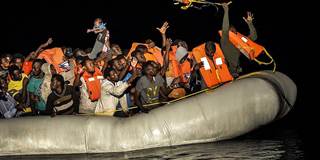For refugees, connectivity is not only a matter of survival; it also provides a route to self-reliance, boosting their own wellbeing and enabling them to contribute to their host communities. So it is vital that governments and the private sector ensure that the promise of Internet access for all includes displaced people.
GENEVA – They were fresh off the boat, the group of refugees I met this time last year. They had fled their homes in Syria, traveled halfway across Turkey, and placed their lives in the hands of a gang of people smugglers promising to get them to Europe. Despite all that they had endured, one of them told me, upon landing on the Greek island of Lesbos, that they had panicked only once during that perilous voyage: when their mobile phone signal disappeared.

GENEVA – They were fresh off the boat, the group of refugees I met this time last year. They had fled their homes in Syria, traveled halfway across Turkey, and placed their lives in the hands of a gang of people smugglers promising to get them to Europe. Despite all that they had endured, one of them told me, upon landing on the Greek island of Lesbos, that they had panicked only once during that perilous voyage: when their mobile phone signal disappeared.